“Doctor, I’ve gained 15 kilos in the past year, my periods are all over the place, and I feel stressed all the time. Is this PCOD?”
At Sneh Fertility Centre, we hear this concern almost daily. And the answer is often yes, these are classic signs of Polycystic Ovarian Disorder (PCOD). But here’s what many women don’t realize: managing PCOD isn’t just about taking medicines. The real power lies in three simple but effective changes you can make starting today.
Understanding PCOD: More Than Just Irregular Periods
PCOD affects 1 in 5 women in India, yet most women only learn about it when they’re trying to get pregnant or when symptoms become severe. It’s a hormonal condition where your ovaries produce excess male hormones (androgens), leading to irregular periods, weight gain, acne, and excessive hair growth.
The frustrating part? PCOD creates a cycle. High insulin levels make you gain weight, excess weight worsens insulin resistance, and this makes PCOD symptoms worse. But breaking this cycle is absolutely possible.
Weight Reduction: Your First Line of Defense
“But doctor, I barely eat anything and still can’t lose weight!” This is the most common complaint we hear. Here’s the truth: with PCOD, your body works differently.
Why Weight Matters in PCOD: When you have PCOD, your body doesn’t process sugar properly. Even a small amount of weight loss — just 5-10% of your current weight — can dramatically improve your symptoms. We’ve seen women whose periods become regular again just by losing 6-8 kilos.
Simple Weight Management Tips:
- Eat every 3-4 hours to keep your blood sugar stable
- Include protein in every meal — dal, eggs, paneer, or chicken
- Choose whole grains over refined ones (brown rice instead of white rice)
- Drink water before meals, not with meals
- Don’t skip breakfast, but make it protein-rich
Remember, crash diets don’t work with PCOD. Slow and steady wins this race.
Lifestyle Modification: Small Changes, Big Results
“What lifestyle changes?” you might ask. The good news is, you don’t need to completely transform your life overnight.
Exercise That Actually Helps: You don’t need to spend hours in the gym. A 30-minute walk after dinner is often more effective than intense workouts for PCOD. Here’s why: gentle, consistent exercise helps your body use insulin better without triggering stress hormones.
Try this simple routine:
- Morning: 10 minutes of stretching or yoga
- Evening: 20-30 minutes of walking
- Twice a week: Some strength training (even bodyweight exercises work)
Sleep (The Forgotten Factor): Poor sleep makes PCOD worse. When you don’t sleep well, your body produces more stress hormones and craves sugary foods. Aim for 7-8 hours of quality sleep. Keep your phone away at least an hour before bed.
Dietary Timing:
- Eat your largest meal at lunch, not dinner
- Stop eating 3 hours before bedtime
- If you must snack, choose nuts or yogurt over biscuits
Stress Management: Breaking the Hormone Chaos
“I’m not stressed, doctor. I’m just tired all the time.” But chronic tiredness is often a sign of chronic stress. And stress makes PCOD symptoms much worse.
How Stress Affects PCOD: When you’re stressed, your body produces cortisol. High cortisol leads to insulin resistance, weight gain around the belly, and irregular periods. It’s like adding fuel to the PCOD fire.
Simple Stress Management Techniques:
Breathing Exercise (5 minutes daily): Sit comfortably, close your eyes, and breathe in for 4 counts, hold for 4, breathe out for 6. Do this for 5 minutes every morning. It sounds simple, but it works.
Mindful Activities:
- Cook a meal without distractions
- Take a warm bath before bed
- Listen to music while doing household work
- Spend 10 minutes in your garden or balcony.
Say No More Often: We see many women with PCOD who try to do everything for everyone. Learn to say no to additional responsibilities when you’re already overwhelmed.
When to Seek Medical Help
While lifestyle changes are powerful, some women need medical support alongside these changes. Visit your gynecologist if:
- Your periods have been irregular for more than 3 months
- You’re gaining weight despite eating less
- You have excessive hair growth on face or body
- You’re planning to get pregnant
At Sneh Fertility Centre, we combine medical treatment with lifestyle guidance because we know that sustainable PCOD management requires both.
PCOD is Manageable, And You’ve Got This
Managing PCOD isn’t about perfection. It’s about making better choices most of the time. Some days you’ll eat that piece of cake or skip your walk — and that’s okay. What matters is getting back on track the next day.
We’ve seen women transform their PCOD symptoms by making these simple changes consistently. Weight comes down, periods become regular, energy improves, and most importantly, they feel in control of their health again.
Remember, PCOD is manageable. You’re not broken, and you’re not alone. With the right approach combining weight management, lifestyle changes, and stress reduction, you can live a healthy, normal life with PCOD.
If you’re struggling with PCOD symptoms, don’t wait for them to get worse. Start with small changes today, and consider consulting with a gynecologist who understands that PCOD management is about treating the whole person, not just the symptoms.
At Sneh Fertility Centre in Udaipur, we believe in empowering women with both medical expertise and practical lifestyle guidance. Our experienced team works with you to create a personalized PCOD management plan that fits your life, not the other way around.
Your journey to better health starts with a single step. Take it today.






